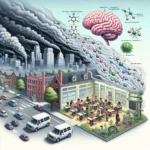Discovering the Link Between Pollution and Cognitive Development: A Deep Dive into Groundbreaking Research
The human brain is a remarkable and complex organ, capable of processing vast amounts of information, learning new skills, and adapting to changing environments. However, recent research has unveiled a concerning connection between environmental factors and cognitive development, with pollution taking center stage. Studies on the effect of pollution on cognitive development have prompted a profound reevaluation of how we perceive air quality and its impact on intellectual growth and intelligence quotient (IQ) outcomes.
Understanding the Impact of Pollution on the Brain
Recent studies have illuminated the detrimental effect that pollution, particularly airborne contaminants, can have on cognitive functions. These revelations are supported by comprehensive examinations of individuals residing in areas with varying air quality levels. Researchers have uncovered a startling correlation: those subjected to higher pollution levels frequently demonstrate reduced cognitive performance compared to their counterparts in cleaner environments.
Pollutants such as fine particulate matter (PM2.5), nitrogen oxides, and sulfur dioxide have been identified as key players in this phenomenon. These substances, often produced by vehicle emissions, industrial processes, and the burning of fossil fuels, can infiltrate the developing brain, leading to potential long-term consequences.
The Impact on Children’s IQ and Cognitive Growth
The implications of pollution on cognitive development are particularly worrisome for children. As their brains undergo swift and critical growth phases, exposure to harmful pollutants can lead to measurable decreases in IQ scores and impede other cognitive faculties crucial for academic success and overall well-being.
Studies have shown that prenatal and early childhood exposure to high pollution levels can interfere with the development of brain functions responsible for memory, attention span, and reasoning abilities. These cognitive deficits, in turn, can carry significant social and economic ramifications, affecting educational outcomes and future career prospects for these individuals.
Tackling the Environmental Challenges for Cognitive Health
Research into the effect of pollution on cognitive development has sparked vigorous discussion around environmental policy and public health initiatives. Governments and organizations worldwide are called upon to consider the far-reaching effects of pollution control – not only for the sake of the planet but for the future intellectual capabilities of their populations.
Investments in clean energy, stricter emissions regulations, and urban planning that prioritizes clean air can potentially mitigate the risks posed by environmental contaminants. Moreover, increasing public awareness about the dangers of pollution to brain health is paramount for driving change and fostering healthier living environments conducive to optimal cognitive development.
Conclusion: The Call for Action and Continued Research
The link between pollution and cognitive development as illustrated by recent IQ test-related studies reaffirms the urgency of addressing environmental issues. As scientists continue to uncover the multifaceted impact of pollutants on cognitive functions, the necessity for immediate and decisive action to safeguard brain health and development becomes clear.
By fostering a deeper understanding of these connections, society can prompt a concerted effort to diminish pollution levels and invest in a future where cognitive well-being is placed at the forefront of public health priorities. The stakes are high, and the time to act is now – for the sake of our children and generations to come.

